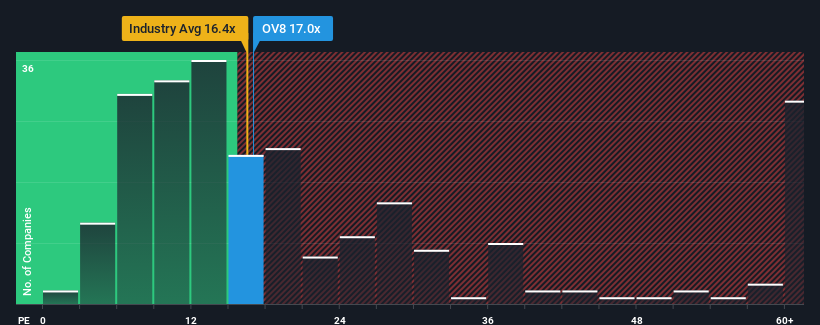- Singapore
- /
- Food and Staples Retail
- /
- SGX:OV8
Sheng Siong Group Ltd (SGX:OV8) Investors Are Less Pessimistic Than Expected

When close to half the companies in Singapore have price-to-earnings ratios (or "P/E's") below 11x, you may consider Sheng Siong Group Ltd (SGX:OV8) as a stock to potentially avoid with its 17x P/E ratio. Nonetheless, we'd need to dig a little deeper to determine if there is a rational basis for the elevated P/E.
Recent times have been pleasing for Sheng Siong Group as its earnings have risen in spite of the market's earnings going into reverse. It seems that many are expecting the company to continue defying the broader market adversity, which has increased investors’ willingness to pay up for the stock. If not, then existing shareholders might be a little nervous about the viability of the share price.
View our latest analysis for Sheng Siong Group

Is There Enough Growth For Sheng Siong Group?
The only time you'd be truly comfortable seeing a P/E as high as Sheng Siong Group's is when the company's growth is on track to outshine the market.
Retrospectively, the last year delivered virtually the same number to the company's bottom line as the year before. This isn't what shareholders were looking for as it means they've been left with a 3.6% decline in EPS over the last three years in total. Therefore, it's fair to say the earnings growth recently has been undesirable for the company.
Turning to the outlook, the next three years should generate growth of 3.0% per annum as estimated by the six analysts watching the company. That's shaping up to be materially lower than the 7.1% each year growth forecast for the broader market.
In light of this, it's alarming that Sheng Siong Group's P/E sits above the majority of other companies. Apparently many investors in the company are way more bullish than analysts indicate and aren't willing to let go of their stock at any price. There's a good chance these shareholders are setting themselves up for future disappointment if the P/E falls to levels more in line with the growth outlook.
What We Can Learn From Sheng Siong Group's P/E?
Using the price-to-earnings ratio alone to determine if you should sell your stock isn't sensible, however it can be a practical guide to the company's future prospects.
We've established that Sheng Siong Group currently trades on a much higher than expected P/E since its forecast growth is lower than the wider market. When we see a weak earnings outlook with slower than market growth, we suspect the share price is at risk of declining, sending the high P/E lower. Unless these conditions improve markedly, it's very challenging to accept these prices as being reasonable.
Plus, you should also learn about this 1 warning sign we've spotted with Sheng Siong Group.
If P/E ratios interest you, you may wish to see this free collection of other companies with strong earnings growth and low P/E ratios.
New: Manage All Your Stock Portfolios in One Place
We've created the ultimate portfolio companion for stock investors, and it's free.
• Connect an unlimited number of Portfolios and see your total in one currency
• Be alerted to new Warning Signs or Risks via email or mobile
• Track the Fair Value of your stocks
Have feedback on this article? Concerned about the content? Get in touch with us directly. Alternatively, email editorial-team (at) simplywallst.com.
This article by Simply Wall St is general in nature. We provide commentary based on historical data and analyst forecasts only using an unbiased methodology and our articles are not intended to be financial advice. It does not constitute a recommendation to buy or sell any stock, and does not take account of your objectives, or your financial situation. We aim to bring you long-term focused analysis driven by fundamental data. Note that our analysis may not factor in the latest price-sensitive company announcements or qualitative material. Simply Wall St has no position in any stocks mentioned.
About SGX:OV8
Sheng Siong Group
An investment holding company, operates a chain of supermarket retail stores in Singapore.
Flawless balance sheet average dividend payer.
Market Insights
Community Narratives



